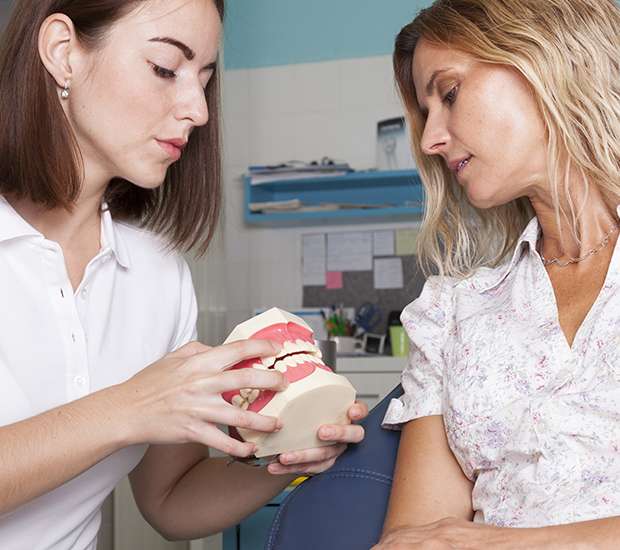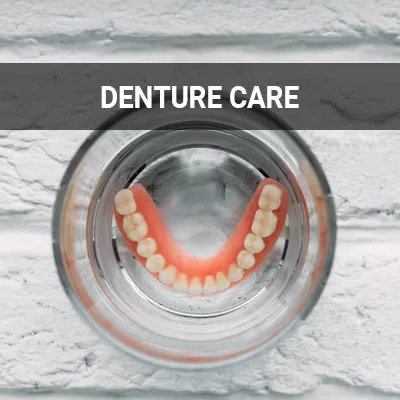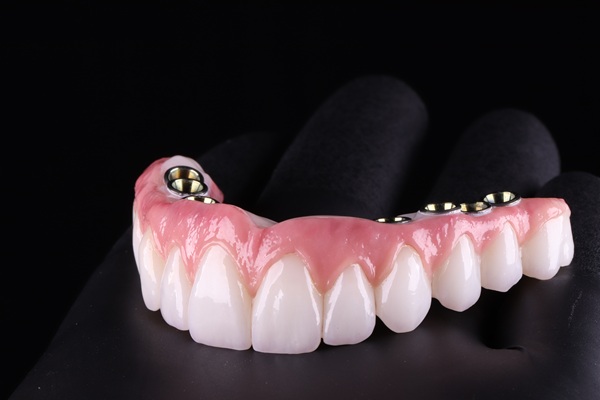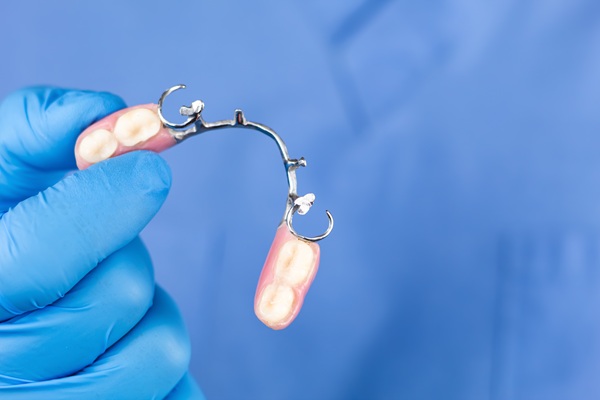What to Expect When Getting Dentures Dumont, NJ
For many people, dentures can restore missing teeth and self-confidence. Many people find that maintaining and that a lifestyle after dentures is not difficult to manage. Preparation before getting dentures involves many things to consider, including proper cleaning, overnight storage, and what types of food to keep stocked in the pantry.
Dentures are available at Dumont Family Dental in Dumont, and the surrounding area. Our team can help you learn more about dentures and how to prepare for them. Call us today at (201) 374-7202 to learn more about our services or schedule an appointment.
Preparing Your Home Before Getting Dentures
Foods that are soft and easy to chew are key. Here are some suggestions for meals and snacks:
- Breakfast. Scrambled eggs, smoothies, grits, muffins, bagels cut into pieces.
- Lunch and dinner. Pulled pork, ground beef, tuna salad, chicken salad, pasta with meatballs, soft fish such as salmon, crab cakes, chili, soup.
- Snacks and side dishes. Mashed potatoes, fresh seedless blueberries, steamed or baked vegetables, olives.
- Dessert. Pudding, ice cream, frozen yogurt, cake, crepes, baked apples.
The best way to clean dentures is with a denture brush. Patients should brush their dentures several times a day, although not with the same toothpaste that the patient was using pre-dentures (or with toothpaste at all). Instead, patients should use special denture-compatible products. If they are unsure, our team can offer r recommendations. For example, regular household soap may be mild enough to clean dentures well. However, it is crucial to use the proper method.
Also, it is a wise investment to get a daily cleanser. As the American Dental Association notes, these cleansers come in the form of tablets, gels, pastes, creams, and solutions. Look for the ADA seal of acceptance on a cleanser. Dental adhesives are good to have as well, especially if you enjoy foods such as corn on the cob that require more biting force. They come in the form of wafers, strips, creams, and powders.
“Patients should brush their dentures several times a day, although not with the same toothpaste that the patient was using pre-dentures (or with toothpaste at all).”
Lifestyle Changes
New denture wearers will experience various lifestyle changes as they adjust to and maintain their appliances. People with new dentures will have to learn how to eat and speak again as the mouth muscles get used to the new feeling. It is normal to experience more saliva flow initially; however, this will fade over time as people get used to wearing dentures.
While speaking may also feel strange with dentures, practicing will help. Practicing will train the mouth muscles and build confidence in speaking with dentures. Other lifestyle changes include diet and oral hygiene routines to keep dentures clean and healthy.
“New denture wearers will experience various lifestyle changes as they adjust to and maintain their appliances.”
Maintaining a Clean Mouth
It is crucial that patients exercise adequate oral hygiene habits to maintain their new dentures and keep the oral cavity clean and healthy. Patients with removable dentures should be especially careful to clean out their mouth and the dentures after each meal. Removable dentures should be placed in a cleaning solution overnight and rinsed before re-wearing in the morning. Patients with fixed dentures should also brush, floss, and rinse after every meal.
We recommend patients purchase a cleaning solution prior to the denture procedure to ensure they have the necessary materials right away. Many types of mild solutions are sold over the counter, such as Efferdent®, Equate®, and Polident®. There is also a variety of cleaning kits available to clean the dentures throughout the day and overnight. Patients with allergies or sensitivities may also use a mild soap as a solution. However, it is pertinent to discuss any allergies prior to the procedure to ensure that the solution is safe and effective.
“We recommend patients purchase a cleaning solution prior to the denture procedure to ensure they have the necessary materials right away.”
Check out what others are saying about our dental services on Yelp: What to Expect When Getting Dentures in Dumont, NJ
What to Expect Before and After
Before the placement procedure, patients can expect a full, thorough rundown of the entire treatment process. We have found that it eases panic levels and induces comfort before and during the procedure. We will inform the patient about the procedure, follow-up care, and any diet and lifestyle changes that will ensue.
Following the procedure, it typically takes patients an average of 30 days to fully adjust to their new dentures. Patients who exercise all pertinent measures and instructions may reduce that time. We will set the follow-up appointments and routinely check the progress of the patient's healing as well as make any alterations as needed. In general, patients should be back to their normal eating and lifestyle after a few weeks.
“We will inform the patient about the procedure, follow-up care, and any diet and lifestyle changes that will ensue.”
Questions Answered on This Page
Q. What lifestyle changes will people experience after getting dentures?
Q. What preparations can be made before getting dentures?
Q. How do I maintain a clean mouth with dentures?
Q. What can I expect before and after denture placement?
People Also Ask
Q. How should people adjust to their new dentures?
Q. How should people take care of their dentures while traveling?
Q. What should I do if my dentures start to feel uncomfortable?
Q. What are the different types of dentures?
Q. How does one get used to dentures?
Q. What are the steps involved in getting partial dentures for one missing tooth?
Frequently Asked Questions
Q. Which type of cleanser is best for my dentures?
A. It depends on your preferences, but many people opt to soak their dentures in a solution. It reduces bacteria, which addresses or prevents odor issues. Other types of cleansers require brushing, which takes more time and attention than a solution.
Q. Can I use toothpaste to care for my dentures?
A. As WebMD explains, traditional toothpaste is too abrasive for dentures. WebMD adds that products with the American Dental Association (ADA) Seal of Acceptance are a great and safe choice. We can go over possible cleaning solutions to use during an appointment.
Q. Will my mouth feel tired in my lifestyle after dentures?
A. Patients' mouths may feel tired because dentures can seem quite heavy and hard at first. The more they wear them, the quicker their mouths will adjust. If they need to start by wearing them for a few hours daily and work their way up, they can do so. If serious issues with pain or soreness persist, you may need an adjustment.
Q. What tips should my family members know about my preparation before getting dentures?
A. If the patient lives in a household with others, it helps if they already eat the same things that the patient does. If possible, the patient, and those whom they live with, can go shopping together for food and dental products such as dental brushes, cleansers, and adhesives.
Q. Will my speech be affected by wearing dentures?
A. Patients may feel like their speech is hard to understand. Chances are, it is not. This effect is exaggerated because dentures affect the vibrations and sound volume traveling to one's ears. Adhesives can keep dentures from "kicking out" while talking. It is encouraged for patients to practice reading out loud so they can get used to speaking with their dentures.
Q. Should I prepare to wear dentures 24 hours a day?
A. Possibly, but only to start. Dentists may advise 24/7 wearing as the quickest route to assess whether the dentures need adjustments. After that, dentures should be removed when going to sleep, as it enables the patient's gums to rest.
Q. What should I do if I produce too much saliva with dentures?
A. One option is to rest the gums by taking dentures out. Alternatively, try drinking more water. A third approach is to suck on sugar-free lozenges.
Denture Terminology
Call Us Today
Taking the right preparations before receiving dentures can aid the adjustment process to dentures. Our team at Dumont Family Dental can help. Call us today at 201-374-7202 to learn more about our services or schedule an appointment.
Helpful Related Links
- American Dental Association (ADA). Glossary of Dental Clinical Terms. 2024
- American Academy of Cosmetic Dentistry® (AACD). Home Page. 2024
- WebMD. WebMD’s Oral Care Guide. 2024
About our business, and website security
- Dumont Family Dental was established in 1973.
- We accept the following payment methods: American Express, Cash, Check, Discover, MasterCard, and Visa
- We serve patients from the following counties: Bergen County
- We serve patients from the following cities: Dumont, New Milford, Bergenfield, Tenafly, Cresskill, Demarest, Haworth, Hackensack, Englewood, Teaneck, River Edge, and Paramus
- National Provider Identifier Database (1689734162). View NPI Registry Information
- Norton Safe Web. View Details
- Trend Micro Site Safety Center. View Details
Back to top of What to Expect When Getting Dentures











